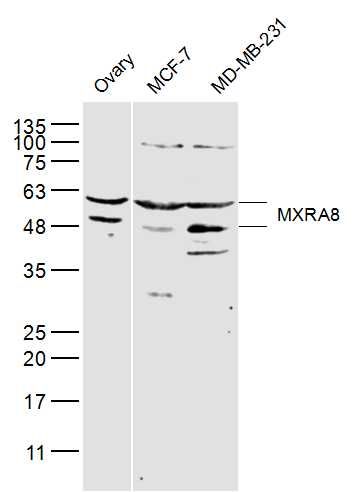MXRA8 Polyclonal Antibody
Purified Rabbit Polyclonal Antibody (Pab)
- 产品详情
- 实验流程
Application
| WB, IHC-P, IHC-F, IF, ICC, E |
|---|---|
| Primary Accession | Q9BRK3 |
| Reactivity | Rat, Pig, Dog, Bovine |
| Host | Rabbit |
| Clonality | Polyclonal |
| Calculated MW | 49132 Da |
| Physical State | Liquid |
| Immunogen | KLH conjugated synthetic peptide derived from human MXRA8 |
| Epitope Specificity | 181-280/442 |
| Isotype | IgG |
| Purity | affinity purified by Protein A |
| Buffer | 0.01M TBS (pH7.4) with 1% BSA, 0.02% Proclin300 and 50% Glycerol. |
| SUBCELLULAR LOCATION | Membrane. |
| SIMILARITY | Contains 2 Ig-like V-type (immunoglobulin-like) domains. |
| Important Note | This product as supplied is intended for research use only, not for use in human, therapeutic or diagnostic applications. |
| Background Descriptions | MXRA8 is a 442 amino acid single-pass type I membrane protein that is implicated in the maintenance and maturation of the blood-brain barrier. Containing two Ig-like V-type (immunoglobulin-like) domains, MXRA8 exists as two alternatively spliced isoforms that are encoded by a gene that maps to human chromosome 1p36.33. Human chromosome 1 spans 260 million base pairs, contains over 3,000 genes and comprises nearly 8% of the human genome. Chromosome 1 houses a large number of disease-associated genes, including those that are involved in familial adenomatous polyposis, Stickler syndrome, Parkinson’s disease, Gaucher disease, schizophrenia and Usher syndrome. Aberrations in chromosome 1 are found in a variety of cancers, including head and neck cancer, malignant melanoma and multiple myeloma |
| Gene ID | 54587 |
|---|---|
| Other Names | Matrix remodeling-associated protein 8, Limitrin, MXRA8 |
| Dilution | WB=1:500-2000,IHC-P=1:100-500,IHC-F=1:100-500,ICC=1:100-500,IF=1:100-500,ELISA=1:5000-10000 |
| Format | 0.01M TBS(pH7.4) with 1% BSA, 0.09% (W/V) sodium azide and 50% Glyce |
| Storage | Store at -20 °C for one year. Avoid repeated freeze/thaw cycles. When reconstituted in sterile pH 7.4 0.01M PBS or diluent of antibody the antibody is stable for at least two weeks at 2-4 °C. |
| Name | MXRA8 |
|---|---|
| Function | Transmembrane protein which can modulate activity of various signaling pathways, probably via binding to integrin ITGAV:ITGB3 (PubMed:22492581, PubMed:23386276). Mediates heterophilic cell-cell interactions in vitro (By similarity). Inhibits osteoclastogenesis downstream of TNFSF11/RANKL and CSF1, where it may function by attenuating signaling via integrin ITGB3 and MAP kinase p38 (By similarity). Plays a role in cartilage formation where it promotes proliferation and maturation of growth plate chondrocytes (By similarity). Stimulates formation of primary cilia in chondrocytes (By similarity). Enhances expression of genes involved in the hedgehog signaling pathway in chondrocytes, including the hedgehog signaling molecule IHH; may also promote signaling via the PTHLH/PTHrP pathway (By similarity). Plays a role in angiogenesis where it suppresses migration of endothelial cells and also promotes their apoptosis (PubMed:23386276). Inhibits VEGF-induced activation of AKT and p38 MAP kinase in endothelial cells (PubMed:23386276). Also inhibits VTN (vitronectin)-mediated integrin ITGAV:ITGB3 signaling and activation of PTK2/FAK (PubMed:23386276). May play a role in the maturation and maintenance of the blood-brain barrier (By similarity). |
| Cellular Location | Cell membrane; Single-pass type I membrane protein. Cell junction, tight junction {ECO:0000250|UniProtKB:Q9DBV4}. Cytoplasm {ECO:0000250|UniProtKB:Q9DBV4}. Cell projection, cilium membrane {ECO:0000250|UniProtKB:Q9DBV4}. Nucleus Note=Primarily localizes to the cell membrane (PubMed:23386276) Detected in the cilium of primary chondrocytes (By similarity). Highly expressed at areas of cell-cell contact and may localize to tight junctions (By similarity). Also found in the nucleus where it is detected in the soluble (as opposed to chromatin-bound) fraction (PubMed:23386276). {ECO:0000250|UniProtKB:Q9DBV4, ECO:0000269|PubMed:23386276} |
| Tissue Location | Detected in endothelial cells in mammary tissue, in both large vessels (left internal mammary artery) and small capillaries (vasa vasorum of the adventitia). |
Research Areas
For Research Use Only. Not For Use In Diagnostic Procedures.
Application Protocols
Provided below are standard protocols that you may find useful for product applications.
终于等到您。ABCEPTA(百远生物)抗体产品。
点击下方“我要评价 ”按钮提交您的反馈信息,您的反馈和评价是我们最宝贵的财富之一,
我们将在1-3个工作日内处理您的反馈信息。
如有疑问,联系:0512-88856768 tech-china@abcepta.com.























 癌症的基本特征包括细胞增殖、血管生成、迁移、凋亡逃避机制和细胞永生等。找到癌症发生过程中这些通路的关键标记物和对应的抗体用于检测至关重要。
癌症的基本特征包括细胞增殖、血管生成、迁移、凋亡逃避机制和细胞永生等。找到癌症发生过程中这些通路的关键标记物和对应的抗体用于检测至关重要。 为您推荐一个泛素化位点预测神器——泛素化分析工具,可以为您的蛋白的泛素化位点作出预测和评分。
为您推荐一个泛素化位点预测神器——泛素化分析工具,可以为您的蛋白的泛素化位点作出预测和评分。 细胞自噬受体图形绘图工具为你的蛋白的细胞受体结合位点作出预测和评分,识别结合到自噬通路中的蛋白是非常重要的,便于让我们理解自噬在正常生理、病理过程中的作用,如发育、细胞分化、神经退化性疾病、压力条件下、感染和癌症。
细胞自噬受体图形绘图工具为你的蛋白的细胞受体结合位点作出预测和评分,识别结合到自噬通路中的蛋白是非常重要的,便于让我们理解自噬在正常生理、病理过程中的作用,如发育、细胞分化、神经退化性疾病、压力条件下、感染和癌症。






